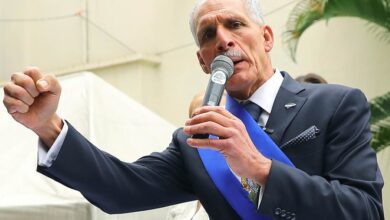Honduras Intercepts Historic Fentanyl Shipment
Honduran authorities seized a record-breaking nearly half-ton of fentanyl, marking a significant narcotics bust for the Central American nation

Photo: X/PoliciaHonduras
Latin American Post Staff
Escucha este artículo
Leer en español: Honduras intercepta cargamento histórico de fentanilo
In an unprecedented narcotics seizure for Honduras, police have intercepted nearly half a metric ton of fentanyl concealed within a shipping container—a stark indication of the Central American country's evolving role in the international drug trade. This substantial discovery has placed Honduras at the frontline in the battle against a potent synthetic drug that has already claimed tens of thousands of lives in the opioid crisis gripping North America.
Honduran Security Minister Gustavo Sanchez announced the haul of 493 kilograms (1,087 pounds) on social media, underscoring the magnitude of the bust with a chilling warning: "It's enough to flood Central America." The fentanyl, packed in dozens of nondescript brown cardboard boxes, was discovered in a shipment that originated from Britain, arriving at the Cortes port—a stone's throw from the industrial hub of San Pedro Sula, situated on the Atlantic Coast.
The seizure of this opioid, which the U.S. Centers for Disease Control and Prevention (CDC) deems up to 100 times stronger than morphine, represents a new chapter for Honduras, previously known as a transit country for cocaine en route to the United States from producers in South America. The fentanyl bust brings to light a potentially growing facet of the drug trade in a nation already marred by narcotics-fueled corruption and violence.
Dangerous Connections: Drug Trafficking and Politics in Honduras
This dramatic turn in the Honduran drug narrative comes as the nation is still grappling with the fallout from the extradition of former President Juan Orlando Hernandez to the United States on cocaine trafficking charges. The case against Hernandez has laid bare the insidious connections between drug cartels and the upper echelons of Honduran politics—a revelation that has sent shockwaves through the country's establishment.
The shock of this seizure is further intensified by the daunting protective gear—hazardous material suits and gas masks—worn by anti-narcotic officers in photos released by the police, visually attesting to the lethal potency of fentanyl. This synthetic opioid has fueled a health crisis in the United States, where an overwhelming majority of the nearly 107,000 drug overdose deaths in 2021 were opioid-related, with fentanyl playing a significant role.
As Honduran authorities continue their investigation to determine the intended destination of the fentanyl, the bust has generated myriad questions about the scope and nature of Honduras' involvement in the global fentanyl trade. With this seizure, Honduras is no longer just a waystation for cocaine; it has become a battleground in the fight against a new, deadly wave of opioid trafficking.
The Future at Stake: Honduras and the Fentanyl Epidemic
The international community has its eyes fixed on Honduras, awaiting decisive action and thorough investigations. There is an urgent need for transparency and cooperation across borders to trace the origins and intended path of the fentanyl shipment, which could have devastating effects if dispersed.
Moreover, the incident has amplified calls for a robust, united international response to the opioid crisis. The need for comprehensive strategies to tackle the demand in North America and the supply chains that snake through countries like Honduras is more pressing than ever.
Also read: Honduras' Shift in Diplomacy Amidst Gaza Conflict
This bust also presents a unique opportunity for the Honduran government to demonstrate its commitment to combating drug trafficking amid historical suspicions of collusion between state officials and the narcotics trade. The current administration has the chance to set a new precedent, ensuring that this significant seizure is not just a fleeting headline but a turning point in the war against illicit drugs.
As Honduras and its international partners confront the complexities of the fentanyl issue, the ramifications of this seizure will likely reverberate for years to come. The nation is at a crossroads, and the steps taken now could be pivotal in determining the future trajectory of the fentanyl epidemic and Honduras' role in it. For a country that has long seen the dark shadow of the drug trade loom over its development, this historic interception may be the beacon of change needed to forge a new path forward.





